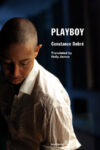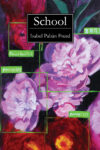
[Melville House Publishing; 2021]
U UP? is a ghost story, a mystery. U UP? is a hyper-modern love letter to the LA queer scene, where ghost-seer Eve drowns the details in boilermakers at Echo Park bars and wine at Hollywood Hills housesits, snorts them away at parties where everyone knows everyone, and everyone knows who everyone’s fucked. U UP? is that friend at dinner who will not put down her fucking phone.
It took me a long time to read through Catie Disabato’s second novel, despite the thickly woven and intriguing story: on the anniversary of her best friend Miguel’s suicide, Eve’s other best friend, Ezra, her chosen twin who has been dumped by a third best friend, Nozlee, ghosts. He deactivates social media, won’t answer her texts, and isn’t at home nursing his post-breakup coke hangover like he should be. Eve follows clues to his whereabouts through Echo Park hot-spots and her further “best” friendships — a seemingly endless supply — while thumbing erratically snarky and desperate texts to her ex-girlfriend, Bea and the ghost of Miguel.
The reason it took me so long to read the book was an impulse of decorum. Or it was a screen addiction. Whenever a friend picks up her phone, my instinct is to pick up mine. I don’t want to look over their shoulder, invade whatever intimate interaction they’re swiping at. Is it shame or envy that leads me to pick up my phone? Maybe I feel abandoned by my friend’s retreat to his screen. Maybe I feel relieved at the opportunity to return to mine. Probably it’s just habit.
Eve swipes up and down the pages of U UP?, one of the first books I’ve seen successfully attempt a graphic representation of a text exchange (a decision Disabato explores with Zan Romanoff in CNMN Mag), spending paragraphs on Twitter and chunks on Gmail and chapters on Instagram. And every time she does, my phone, wherever it is in the house, wherever I’ve plugged it in out of sight to prevent myself from picking it up while I read, cries out.
But Eve’s friends don’t seem to mind her intense online-ness. They’re as online as she is. It’s a language they all speak together, like the language of local spots and their lesbian nights. Like the language of loss: stammering, skirting references to the year before when Eve discovered Miggy’s body in the Palm Springs hotel. What they do mind is her narcissism, though nobody comes out and says it quite like that. Instead, they say things like, “We’ve given you a lot of leeway this year,” and gently remind her that every assumption she makes about Ezra’s emotional state is a projection. Eve’s friends are good friends, the kind of friends you want, the kind of friends you might accidentally fall in love with, or who might accidentally fall in love with you.
Eve has made out with, if not slept with, a large portion of her friends. Everyone she introduces us to, she sexualizes at least a little bit, describing their bodies with care and admiration and sometimes more than a hint of longing (then again, Eve’s whole character is a hint of longing — Disabato never reveals Eve’s birth chart but I have to assume there’s a heavy serving of Scorpio in there). The boundaries between romantic and platonic are blurry and frequently crossed, and I have a hard time interpreting my own response to this kind of life. Sometimes I think Eve is greedy, trying to turn everyone into everything and only for her. Then I chide myself: I’m projecting. I’m the greedy one, and actually I’m envious of Eve’s ability and opportunity to fall in and out of love with her friends without losing them entirely.
So while U UP? is a love letter to Los Angeles, it’s more of a love letter to the future of romantic friendship. If you remove LA from the equation, maybe you get Diana Hamilton’s brilliant poem, “Epistolary Romance on Love and Friendship,” a love letter to her roommate Shiv that tests the walls of their friendship. In this poem, Hamilton implores Shiv to tell her the plot of his love life, and projects his response onto the page that she writes to him:
“You know that story already, Diana,” I know
you’d say, “it’s about love and friendship;
it’s about figuring out whether Love is so big
it doesn’t matter who is a man or a friend
or a woman or hetero- homo- or otherwise
mono-sexual in a direction that precludes
neither friendship nor love, but sex, but the sex
and its absence or occasional near-presence
or presence in various forms is enough
of a problem to call into question both
love and friendship, neither of which ought
to require sex, if love is this big, the sex
should be big too, not little, you know
about sex with friends.”
Of course, while the musing may be an accurate projection, based on the intimate hours spent living with a person, it is a projection none-the-less. Every love letter is a projection of a fantasy. Earlier in the poem, Hamilton writes,
. . . Our friends’ refusal to sleep with us
is so much more generous, as they don’t do us
the violence of putting a real person’s needs
in the place of their roles in our fantasies.
Did we think that with faster and faster letters that can travel longer and longer distances (e-mail and text messages, DMs and public addresses in the form of ‘gramming and tweeting), we were leaving the epistolary age behind? That finally we would be able to really connect, wipe the fantasy from the screen and see clearly through to the person behind the blinking DOT DOT DOT that tells us our correspondent is composing their letter? But the mirage remains: every Instagram post is a projection of the fantasies we tell about ourselves, and every response is a projected assumption our friends and followers make about that fantasy. Every text is epistolary, lacking the exchange of breath that reminds us that the person with whom we communicate is a real body, a real person with needs.
Eve projects on Ezra and Nozlee and Miggy, and the rest of the intricate cast of U UP?, right until the end, when they all come together for an embodied (or, in Miggy’s case, ghostly) blow up. In the flesh, feelings are harder to deny, and boundaries blur and solidify unpredictably in real time. Eve is confronted with her avoidance and projection. Her fantasy is thrown in her face until somebody breathes on the screen and wipes it away so that finally, she can see clearly.
Hannah Lamb-Vines reads and writes in New York City, northern California, and the Texas panhandle, depending on the time of year. Her work has recently been featured or is forthcoming in Columbia Journal, HAD, and Black Telephone Magazine, among others.
This post may contain affiliate links.







